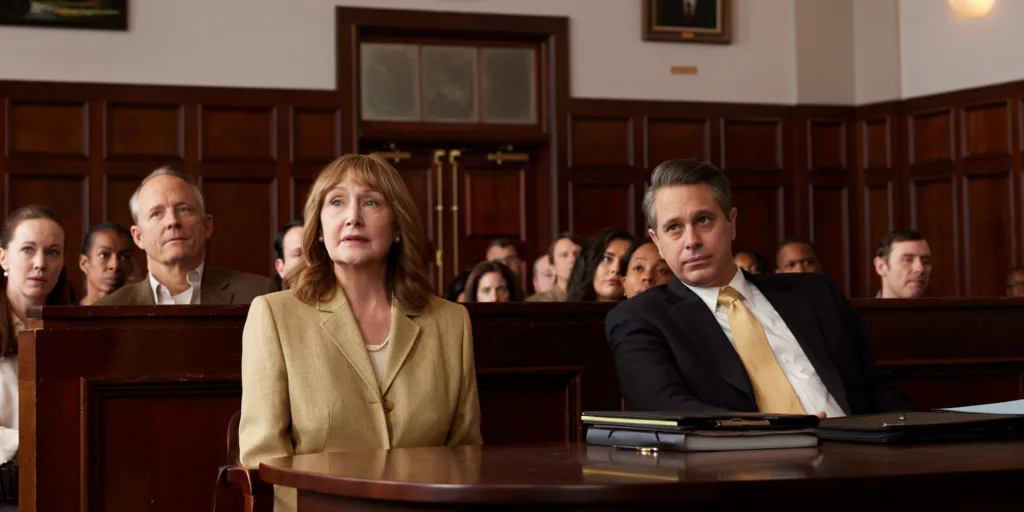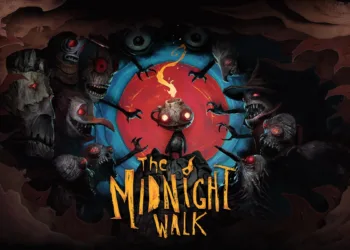Rachel Feldman’s Lilly (2024) unfolds a distinctly American saga—Lilly Ledbetter’s legal crusade against Goodyear for pay equity—yet it resonates well beyond U.S. borders. Co‑written with Adam Prince, this 93‑minute feature places Patricia Clarkson at its center, channeling Ledbetter’s quiet determination as she moves from a 1979 factory floor to the halls of the Supreme Court.
From the opening reenactment of Ledbetter’s 2008 Democratic Convention address, the film weaves together dramatized scenes and archival footage, prominently featuring clips of Supreme Court Justice Ruth Bader Ginsburg. This hybrid approach—equal parts narrative and documentary—mirrors techniques found in global art‑house cinema, where historical realism is often punctuated by reflexive commentary. The grayscale-to-color shift, triggered by Ledbetter’s first meeting with her lawyer, Jon Goldfarb, evokes visual signaling strategies seen in European political dramas, yet here it underscores the personal stakes of a legal battle rooted in regional labor culture.
While the core narrative is steeped in Alabama’s industrial heritage and late‑20th‑century American workplace dynamics, the themes of wage disparity and systemic bias carry universal weight. The film’s pacing, which blazes through two decades, may feel brisk compared to more meditative international biopics, yet it captures the urgency of a story that helped reshape global conversations on gender and labor rights—inviting viewers to reflect on how local struggles ripple across cultural divides.
Temporal Threads and Hybrid Storytelling
The film kicks off with a crisp, almost game‑like cold open: Lilly Ledbetter addressing delegates at the 2008 Democratic National Convention. That scene functions like a prologue level in narrative‑driven titles—think the dramatic tutorials of Life Is Strange—where the stakes are laid out before plunging players (or viewers) into past chapters. What follows is a rapid succession of flashbacks to 1979, 1989, 1992, 1998, and 2003. These leaps mirror the chapter‑select screens of episodic games, yet because each vignette spans years rather than hours, emotional investments risk being diluted. In Korean cinema, similar temporal spirals in films like Burning use longer dwell times to build atmosphere; here, the brisk tempo keeps momentum high but sometimes sacrifices depth of feeling.
Alongside its dramatized beats, Lilly interlaces real footage of Ruth Bader Ginsburg, Barack Obama, and Joe Biden, much as documentary games—like 1979 Revolution: Black Friday—splice archival photos into interactive sequences. In Feldman’s film, these clips can foreshadow courtroom outcomes (Ginsburg’s voice sketching legal stakes) or recap past scenes (Biden applauding at the convention), creating a dual commentary track. This hybrid strategy praises authenticity but occasionally feels didactic, as if the film doubts its own reenactments without an expert narrator to reinforce them.
Clocking in at just over 90 minutes, the movie treats two decades of struggle as a series of bullet points rather than a slow burn. Like a speed‑run through a sprawling RPG, it highlights key “boss battles”—factory harassment, trial victories—while giving us only cursory views of the daily grind. As with fast‑paced European thrillers that condense history into gestural scenes, the result keeps the global viewer alert but may leave them wanting more space to breathe into Lilly’s trials.
Feldman signals narrative shifts with a grayscale‑to‑color transition when Lilly gains legal counsel, echoing visual cues in art‑house documentaries across Latin America. On‑screen text introduces characters—“Jon Goldfarb, Attorney”—in a style reminiscent of UI overlays in adventure games, framing each new ally or adversary. Montage sequences of speeches and campaign stops accelerate the action, recalling rhythm and pacing in action RPG cutscenes. These tools align cinematic form and interactive sensibility, yet they sometimes collide, creating moments that feel pulled between the intimacy of a character study and the brisk utility of a digital interface.
Embodying Resilience: Performances Across Borders
Patricia Clarkson’s portrayal of Lilly Ledbetter unfolds with a quietly forceful precision that recalls the restrained intensity of Japan’s Ozu heroines or the meditative poise of Nordic protagonists. In the factory‑harassment sequence—where a co‑worker hurls a tire and a crude hand lingers too long—Clarkson’s eyes register both shock and steely defiance, much like the subtle shifts in tone seen in South Korean melodramas.
During Lilly’s first courtroom victory, she stands at the lectern with measured breaths, her poised restraint contrasting the sweeping emotional crescendos of American biopics; this balance of hurt and resolve channels a universal language of perseverance that transcends cultural borders. When she later steps onto the convention stage, Clarkson shifts into a controlled projection, echoing the ritualized speeches of political dramas in European cinema, and reminding global viewers how personal testimony can double as collective rallying cry.
John Benjamin Hickey’s Charles Ledbetter feels drawn from an international tradition of supportive partners found in Argentine family sagas: his few lines underscore a steady devotion rather than stealing the spotlight. In their kitchen‑table conversations, Hickey’s gentle nods and soft inflections carry more weight than his dialogue-heavy moments. By contrast, Thomas Sadoski as Jon Goldfarb occasionally drifts into explanatory monologues—his lecturing speeches reminiscent of quest‑giving NPCs in role‑playing games, where verbal exposition substitutes for interactive discovery. Yet when he simply watches Lilly argue her case, the unspoken empathy in his gaze resonates with interactive narratives that privilege player emotions over text.
The factory‑floor antagonists, drawn as hard‑edged stereotypes, verge on caricature—villains who sneer and jibe in broad strokes, much like arcade bosses in 1990s Japanese beat ’em‑ups. Their extreme sexism heightens tension but also risks flattening complex social dynamics into clear adversarial roles.
Meanwhile, Lilly’s relationship with her son Phil weaves a quieter counterpoint: his ambition‑laden glances mirror his mother’s early drive, reflecting shifting generational values seen in contemporary Mexican coming‑of‑age films. The ballroom‑dancing interludes, while visually graceful, sometimes feel ornamental—like side quests in open‑world games that offer character color but little narrative impact. This tension between depth and decoration underscores how cross‑media storytelling must calibrate every beat to sustain both emotional and thematic cohesion…
Global Visual Syntax and Editorial Rhythms
Feldman treads a line between classic biopic and hybrid docudrama, channeling impulses common to both American network films and European vérité dramas. Her intent is to honor Ledbetter’s legacy while keeping images kinetic, yet at times the film hesitates—leaning into archival clips when a purely cinematic reenactment might have carried the emotional weight on its own. This tension mirrors the balance struck in Japanese historical dramas that occasionally insert narrator commentary, raising questions about whether respect for source material can coexist with the freedom of cinematic invention.
Scenes snap between factory floors, courtroom chambers, and convention stages with brisk cuts that recall fast‑paced thriller montages in South Korean cinema. Yet the placement of Ruth Bader Ginsburg interludes can feel like a reset button—pausing dramatic momentum to provide exposition. Much like a game that interrupts active play for text‑heavy cutscenes, these interjections reinforce context but sometimes fracture emotional immersion. In other moments, the choppy transitions clarify a multi‑decade story, offering narrative signposts reminiscent of level transitions in adventure titles where each snippet prepares you for the next challenge.
Feldman employs a muted palette for early decades—sepia‑tinged grays and blues evoke mid‑century Americana—then switches to saturated hues when Ledbetter secures legal aid, echoing color symbolism in Latin American political films where brightness marks moments of agency. Close‑ups linger on Clarkson’s furrowed brow or a courtroom witness’s tremor, while wider frames situate her small figure amid towering institutional architecture, reflecting global cinema’s use of scale to comment on individual versus system. These visual decisions probe how memory and justice interplay across cultures—inviting viewers to consider whether color itself can carry the weight of social change…
Sonic Architectures and Material Worlds
In Lilly, the country‑tinged needle drops function like leitmotifs in folk‑influenced indie films from Australia or Ireland, marking moments when Ledbetter’s resolve shines. When a plaintive guitar chords under her factory confrontation, it echoes the narrative beats of Mexican political dramas, where rural ballads underscore social injustice. Yet at times the music veers into sentimentality—string swells announcing Lilly’s courtroom breakthroughs can feel staged, similar to how some blockbuster games override player discovery with orchestral fanfare that signals “this is important.”
The sound design roots each scene in place. The factory floor hums with the clatter of machinery and murmur of coworkers, aural textures reminiscent of German industrial films that treat the workplace as character. That dense ambient track contrasts sharply with the hush of the courtroom, where silence becomes a tool—every cough or turned page acquires weight, mirroring techniques in Nordic dramas that use quiet to frame moral scrutiny.
Production design and costumes chart Lilly’s journey through decades. Her 1970s Goodyear uniform, with its stiff cotton and faded patches, feels as weathered as sets in Italian neorealist cinema, while her 2000s professional attire—tailored blazer, crisp blouse—speaks to the modernized public persona she adopts. Political rallies are dressed with banners and podiums that recall British campaign films, giving global texture to scenes of American advocacy. These layers of sound and space work together to anchor Lilly’s story in both a deeply local origin and a shared cinematic language…
Crossroads of Equity and Expression
Lilly confronts the disparities ingrained in a male‑dominated workplace through direct scenes—the tire‑tossing confrontation recalls the blunt realism of Ken Loach’s British social dramas—while pay stubs visualized on screen echo the data‑driven spikes familiar to Scandinavian documentaries. These stylistic choices highlight the tension between institutional statistics and personal experience, a contrast also found in narrative games like Her Story, where textual records and lived testimony collide.
Lilly’s progression from silent endurance to courtroom advocate unfolds alongside a color shift from muted grays to vibrant tones, mirroring the emergence of empowered female protagonists in modern South Korean cinema. Her husband’s steadfast support, Goldfarb’s measured guidance, and Ginsburg’s recorded interjections all function as catalysts, suggesting that meaningful change often requires collaboration across private and public spheres—an idea that resonates with collective‑action themes in Latin American political films.
The film’s legal scenes aim for procedural fidelity: evidentiary exchanges and judge‑led interrogations recall the meticulous courtroom portrayals of Japanese dramas. Yet Ginsburg’s voice, while informative, sometimes pauses the film’s emotional undercurrent—akin to a game that interrupts active play with text‑heavy cutscenes. This choice clarifies complex rulings for global audiences but also risks fragmenting the story’s momentum, underscoring the delicate balance between expert commentary and immersive storytelling…
Legacy and Global Resonance
In essence, Clarkson’s portrayal anchors Lilly’s ambition, offering a study in controlled intensity that reflects a wider cinematic language—from the quiet potency of Nordic drama to the emotive restraint of East Asian social realism. Her composed presence conveys both vulnerability and resolve, grounding a film that occasionally rushes through pivotal decades.
The film’s swift pacing captures key milestones—factory confrontations, courtroom victories, public testimony—yet those rapid shifts can undercut the nuances of Lilly’s evolution. Viewers drawn to immersive character studies in international biopics may find the highlights‑only approach leaves emotional undercurrents underexplored, even as the story’s core message about wage equity maintains its universal urgency.
Audiences invested in social‑justice narratives—whether through Latin American documentaries on labor rights or British political thrillers—will appreciate the film’s thematic ambition and Clarkson’s steady guidance. Those seeking more measured tonal shifts or deeper cultural immersion might feel sidelined by the brisk montage of events.
Lilly’s tale, though rooted in Alabama’s industrial landscape, speaks across borders: her fight parallels movements from Mumbai factory floors to Scandinavian boardrooms. As film and interactive media continue to intersect—each borrowing framing devices, pacing rhythms, and testimonial techniques—Lilly invites us to consider how stories of personal agency transmit within diverse traditions, and what fresh forms of storytelling those exchanges will inspire…
Full Credits
Director: Rachel Feldman
Writers: Rachel Feldman, Adam Prince
Producers: Rachel Feldman, Allyn Stewart, Kelly E. Ashton, Kerianne Flynn, Jyoti Sarda, Simone Pero, J. Todd Harris, Christine Schwarzman, Julie Kaufman
Executive Producers: Kelly E. Ashton, Jyoti Sarda, Kerianne Flynn, J. Todd Harris, Richard D. Batchelder Jr., Mary Jane Elmore, Wendy Federman, Patti Hart, Milledge Hart, Lisa Anderson Kelley, Jen Radjikowski, Kim Robson, Jayne Baron Sherman, Regina K. Scully
Cast: Patricia Clarkson, John Benjamin Hickey, Thomas Sadoski, Deirdre Lovejoy, Josh McDermitt, Rhoda Griffis, Joshua Mikel, Ned Vaughn, Judd Lormand, Bethany Anne Lind, Jordan Cox, Nancy De Mayo, Angela Sant’Albano, Gilbert Glenn Brown, Paul Teal
Director of Photography (Cinematographer): Noah Greenberg
Editors: Nancy Richardson, Joan Sobel
Composer: Ariel Marx
The Review
Lilly
Lilly offers a vital story anchored by Patricia Clarkson’s measured performance and a hybrid storytelling approach that bridges reenactment with archival insight. Yet its brisk 90‑minute span and intermittent tonal shifts can dilute emotional impact. Still, its portrayal of Ledbetter’s fight for pay equity resonates globally, reminding audiences of the ongoing battle for workplace justice.
PROS
- Patricia Clarkson’s restrained, powerful lead performance
- Important subject matter with global relevance
- Hybrid use of reenactment and real footage adds authenticity
- Strong visual cues (grayscale-to-color shift) underline narrative beats
- Clear depiction of systemic pay injustice
CONS
- Rushed pacing compresses decades into brief vignettes
- Tonal jumps between drama and documentary can feel jarring
- Supporting characters sometimes verge on stereotype
- Emotional moments underdeveloped due to time constraints

















































